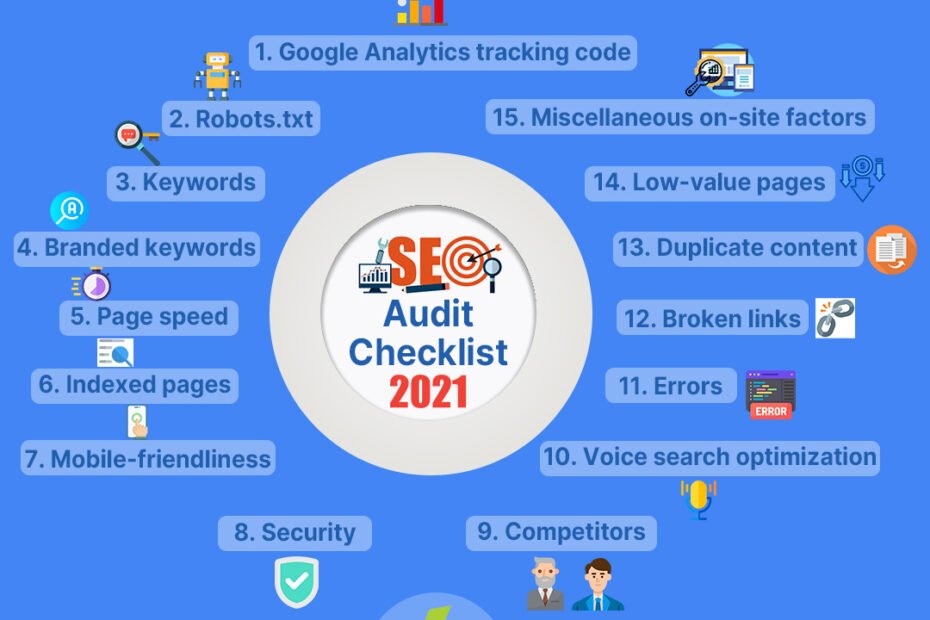Keeping up with the latest SEO practices can be overwhelming for someone just starting as a new website owner.
Also, ensuring that existing SEO implementations are regularly serviced according to the latest Google algorithm changes can be a tiring task for some.
To make sure you are not missing out on them, you should regularly conduct an SEO audit of your website/blog. By keeping a checklist on hand, you keep a list of standard SEO audit tasks that ensures none of the crucial points is missed.
In these articles, we will offer you a comprehensive checklist to effectively perform your website SEO audit.
Now, let’s dive into the content of the checklist for your next SEO audit.
Determine Your Site SEO Audit Goals
This is the most crucial task for your SEO audit checklist, where you determine the goal or purpose of why you need an SEO audit. These goals will eventually define the scope of this checklist and perhaps do things a little differently.
For example, if your website is not producing the desired speed results, you may want to run an SEO audit and determine what is causing the problem. On the other hand, if there is a sudden drop in traffic metrics, you may want to fix things through an SEO audit. Well, there are many similar goals behind this activity, and by carefully evaluating them, you will be able to conduct an SEO audit more effectively.
Keyword analysis
SEO starts with keywords, so it’s a good idea to begin your audit by analyzing what keywords your site is using and if you’re looking for the right ones.
Make sure to use less competitive, long-tail keywords specific to the industry you work in. The right keyword will be relevant, measurable and it will help you rank better.
Some tools that you can use are UberSuggest, SEMrush, Google keyword planner, and Google trends.
It would be best to run a keyword strategy that targets time-bound keywords simply because as your website grows, you will need to broaden your keyword search and look for other extensive keywords to help you rank better.
Too many keywords on the website will destroy your SEO game. Refresh the keyword count as necessary. Include keywords in the URL to help your pages/posts rank better and make sure these URLs are short.
Keyword cannibalization is another SEO downgrade factor for your website. It occurs when two pages on your website compete for the same keyword. Make sure you implement decisions to take care of it.
Later in the audit, you will be asked to analyze the competition for these keywords.
Content analysis
Start by checking your site for duplicate content on various plagiarism checker tools. By providing a match percentage, it shows the result of pages that match other pages.
Good content that helps your website rank better is attractive and SEO optimized. Ensure you are using your target keywords in all the correct places throughout a page on your website.
*Keyword in post/page title
*Keyword in the first paragraph
*Keyword occurrence in H1 tag
*Keyword usage in post meta-description
*Keyword occurrence in the URL structure
*Keyword in alt text from the first image used
*Keyword occurrences towards the end of the post content.
To ensure your content is engaging, constantly update user-generated data in the comment section of your blogs. Keep engaging with the audience so you can generate a good amount of SEO juice too.
Making sure your content is of the proper length is just as important as using quality content. Create the right content strategy that is well balanced with short, medium, and long-form articles. Regular content posting is also a great SEO booster.
Image optimization check
Make sure to optimize the images present on your website. There are several plugins available that can help you optimize images. And don’t forget to implement the following:
. Use high-resolution images
*Resize them to declutter your site database
*Use relevant image matching your text
*Name your image file correctly by using your target keyword
*Use image alt text.
*Content promotion analysis
*If your website uses content promotion services to share your updates through social media channels, make sure they are well integrated and working as intended.
Web hosting control
The right web host increases your site’s SEO efforts by complementing your server reputation, website uptime, and the loading speed it offers. Every SEO audit should be an event where you review your existing web host’s performance and, if necessary, make the change and choose a better service provider.
Resources like HostingBooth can be beneficial when looking to compare the performance of existing hosting service providers.
Website loading speed control
Use various tools to determine the existing speed of your website. If it takes longer than 2-3 seconds to load, be sure to fix it by following the necessary steps as soon as possible.
Don’t skip the mobile website loading time.
